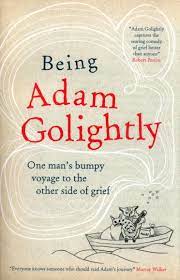
You would think, wouldn’t you, that if your partner had died, the last thing you’d want to read about is someone else who’s been widowed, but in fact it is strangely interesting. Mostly to be consoled by the fact that grief is a rocky road and we all navigate it differently. Hence the subtitle to ‘Being Adam Golightly – One man’s bumpy voyage to the other side of grief.’ I know it makes it sound like crossing the A34 on a busy Friday, but it does avoid saying that this is a ‘journey’. Because I can assure you, no one wants to buy a ticket for that particular cliché.
Adam Golightly is a pseudonym: the author of the book wrote a regular column for ‘The Guardian’, in which he shared his experiences as ‘The Widower of the Parish‘.
Adam’s children are aged 10 and 14 when their Mum dies, so he has to step up to parenting on his own. I got the impression he was a pretty hands-on dad anyway, it isn’t as if he needs to read the instruction manual for the toaster, but there are nevertheless practical challenges. Ballet shoe ribbons and alcohol for teenage parties provide more of a learning opportunity. But the widower’s relationship with his children is honest and open, with lots of moments of humour as well as sadness.
Within the book, which reflects on the past as well as dealing with the present and looking to the future, the author tackles lots of the practical aspects as well as some of the more emotional ones: collecting ashes and what to do with them, money worries, drinking too much, whether to wear a wedding ring, dating and socialising, going back to work. He finds having a pet around the place comforting and faces the first Christmas. I particularly identified with the way Adam describes Helen’s possessions as ‘portkeys’, seemingly random objects which have the ability to transport him to another place or time in memory.
Golightly is a funny, charming and insightful narrator and were many times during the book that I found myself nodding in agreement and recognition. It made me feel part of something bigger than my own experience, which I found comforting. Which led me to think about what the appeal of the book might be to those readers who haven’t had their spouse die of ‘fucking cancer‘ (Adam’s words, not mine. Although I wholeheartedly endorse the sentiment) or anything else. I’m not a fan of ‘Dos and Don’ts’ which prescribe how to talk to a bereaved friend – there are so many variables and what might make one person cringe is another’s solace. But this book is a gentle insight into what might be going on in our lives, or minds. However, if you are looking for help tailoring pointe shoe tapes, don’t go here – Adam stabs himself in the thigh with a needle!
You must be logged in to post a comment.